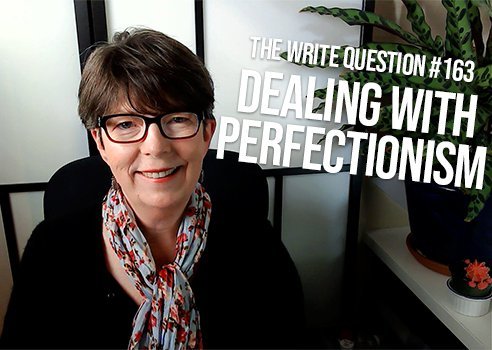Viewing time: 5 mins 42 secs
The Write Question is a weekly video podcast all about writing. Today’s question? How to deal with perfectionism in writing. If you have a question you’d like me to answer you can email me, tweet me @pubcoach, or leave a message for me at the Skype account, The Write Question.
Transcript:
How can you deal with perfectionism? That’s the topic I’m addressing today in The Write Question. I’m Daphne Gray-Grant, the Publication Coach, still in pandemic mode.
I have a question from Nan Woody, a student based in Tirana, Albania. Here’s what she’s asked by email….
“I face four big issues when it comes to writing. Panic: I feel as though I will never finish my paper. Perfectionism: I want my writing to be perfect (even though I know that no one else is perfect, and I am a human being like everyone else.) Impostor syndrome: I keep asking myself what I’m doing here. Lack of confidence: I don’t trust my results, and I trivialise my work all the time. Can you give me any advice that will help?”
Thanks for your questions, Nan. I don’t know if this will help, but the vast majority of grad students I work with feel exactly the same way.
It’s also interesting that the four points you mention —panic, perfectionism, imposter syndrome and lack of confidence— are so clearly related to each other.
In fact, to me, all your problems stem from the same root — perfectionism.
Think about it! Panic comes from perfectionism, because you know you can never be perfect. In fact, you made that point in your question to me. Imposter syndrome comes from perfectionism because you feel fake. Why? Because you’re not perfect, of course! Lack of confidence comes from perfectionism because you want to be perfect and you’re not.
So, I strongly suggest you address your perfectionism, and I think those other problems will fall by the wayside. Here are seven tips for you:
1- Recognize that perfectionism is a problem
Something about the word “perfect” sounds delightful to the human ear. What could be better than perfect? But that idea is a trap. When you expect perfection, you’re setting an unhealthy standard that’s both self-defeating and demoralising. Keep reminding yourself that good enough is in fact good enough!
2- Create more realistic goals for yourself
Replace your perfectionistic expectations with ones that you can actually achieve. And pay attention to what you CAN do rather than factors you can’t control. For example, you have no power over whether your prof gives you an A. But you DO have the opportunity to finish the first draft of your paper five days early so you have plenty of time for editing.
3- Be aware that a first draft will never be any good
Some of my clients feel despair that their writing is no good. Here’s what I tell them: NO ONE’S first draft is any good, not even Stephen King’s or Margaret Atwood’s. All professional writers understand that writing is an iterative process. Your work will improve with each draft so your main challenge is to produce the first draft as quickly as possible so you have plenty of time for editing.
4- Challenge your inner critic
Our inner critics love to give us a bad time. They tell us we’re no good, that we’re imposters and that everyone else is much more successful and talented. Even super-successful writers like Maya Angelou (see link below) felt this way. Understand that this is just talk with no evidence. Tell your inner critic to take a hike!
5- Stop yourself from multitasking
Multitasking, where you try to do more than one thing at a time, is endemic among students. They not only try to juggle texting and writing or Facebooking and writing but they also try to manage researching while writing or editing while writing. Resolve that you will NOT allow yourself to go down this troubled path. Multitasking is stressful and will cause you to make more mistakes. Do just one thing at a time. When you write, write. When you edit, edit. You’ll be a much happier person — and a better writer — that way.
6- Stop procrastinating
Don’t wait for the perfect moment to start your next essay. Instead, begin it immediately — as soon as you get the assignment. You will be empowered by taking action, and you’ll get more done.
7- Understand that time off is not time wasted
Many people who suffer from perfectionism drive themselves so hard that they refuse to take time off or do anything fun at all. This is always a mistake. But if this attitude describes you, I encourage you to read the book The Now Habit by Neil Fiore (see link in the show notes.) Fiore presents a delightful plan for something he calls an unschedule. I think you’ll find it very helpful.
Finally, let me wrap up with a quote from the writer and marketer Ryan Holiday:
“Perfectionism rarely begets perfection, or satisfaction — only disappointment.”
Nan, perfectionism is a soul-sucking habit. Take steps to fight it immediately. Embracing your own imperfection will be the best favour you can do for yourself.
*
If you’d like to learn more about how to make writing a happier and more rewarding process, check out my latest book Your Happy First Draft. I don’t sell it in bookstores or via Amazon. The only place to buy it is on my website, link on the screen below and in the show notes.


